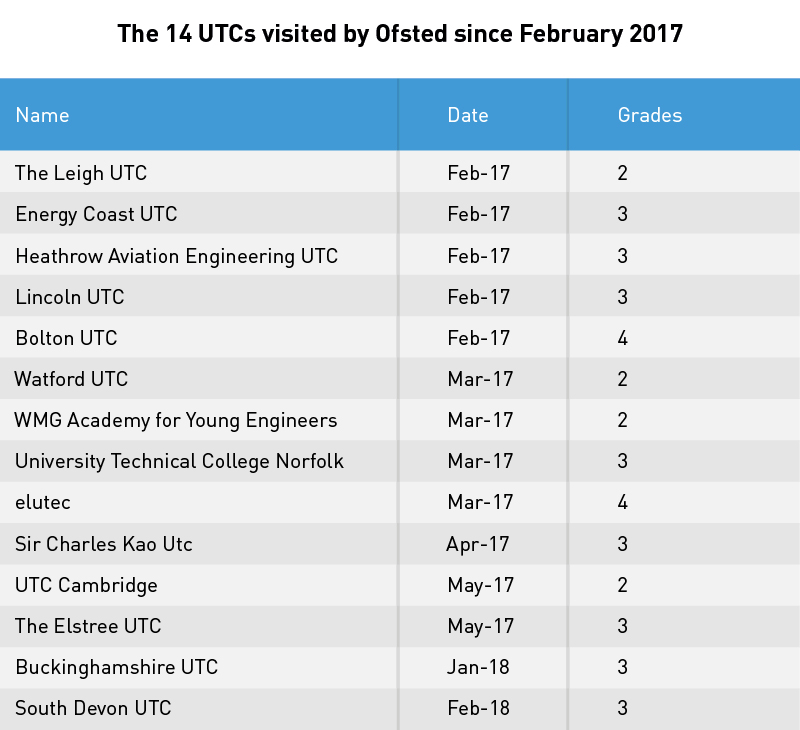More than two thirds of the university technical colleges visited by Ofsted in the last year received ratings that were less than ‘good’, according to FE Week analysis.
But the organisation which oversees UTCs has hit back, saying it believes the watchdog’s inspection regime is not designed to measure their performance in the most accurate way possible.
Ofsted inspected 14 UTCs between February 2017 and February 2018, but just four of these, or 29 per cent, received a grade two, while none at all were rated ‘outstanding’.
Meanwhile, 10 (71 per cent) were rated at grades three or four, both of which are considered unacceptable by Ofsted.
The Baker Dearing Trust told FE Week that UTCs are “new and innovative” colleges which are inspected “before many of them have a settled position in the local education landscape”.
Its spokesperson claimed that the trust hopes that “over time”, the “outstanding destinations” found at UTCs will “carry more weight” in Ofsted reports.
According to FE Week’s analysis, a total of 29 of the 14-to-19 technical institutions – including several which have since closed – have now been inspected, of which 17 (59 per cent) had the lowest two grades.

BDT’s spokesperson said that the “objective” is to have every UTC rated ‘good’ or ‘outstanding’, and claimed the trust works “closely and constructively” with those that have yet to reach the benchmark.
The UTC movement launched in 2011 with the backing of former Conservative education secretary Lord Baker.
These specialist technical education providers are seen by many as unwelcome competition to more established general FE and sixth-form colleges, which consistently return a much higher proportion of higher Ofsted grades.
UTCs’ Ofsted results remain well below those of independent training providers, sixth-form colleges, and general FE colleges – the last of which have themselves seen rapid recent improvement over the past year.
FE Week’s last report on UTC inspections in March 2017, showed that the education watchdog had visited 20 of the providers. Only nine (45 per cent) were considered good enough for the upper two grades.
UTCs are new and innovative colleges which are inspected before many of them have a settled position
Our new analysis reveals a fall of four percentage points in the past year.
BDT pointed out that if only the 23 UTCs that are still open and have had inspections are taken into account, 52 per cent are at grades one or two.
This still however places UTC performance well below that of other FE providers.
FE Week revealed last month that as of February 7, just under three quarters of colleges are now rated ‘good’ or ‘outstanding’.
The proportion of sixth-form colleges achieving the top two grades was at 81 per cent in September, and independent training providers were at 80 per cent.
The most recent inspection reports into UTCs, at the institutions in South Devon and Buckinghamshire, both produced grade threes.
It was the second ‘requires improvement’ rating in a row for Buckinghamshire, which had just 147 students on roll, despite a capacity of 600, in the last academic year.
Inspectors said that overall progress in English, maths and science has been “well below” the national average for the last three years, and the quality of teaching is “inconsistent”.
It was the first time South Devon UTC has been subject to an inspection since it opened in September 2015. The college currently has just over 200 students, but senior leaders were criticised because they’ve “not secured consistently effective” teaching as it has grown in size.
Most UTCs have struggled since they were established in 2010, mainly because they’ve not been able to attract enough pupils to stay financially viable. Eight have so far closed.
An investigation in January by FE Week revealed that almost every UTC missed their recruitment targets last year, leaving them with combined debts of over £11 million.
The ESFA is trying to retrieve cash from 39 of 44 UTCs still open in 2016/17.









I think it is time for a reality check. There may be some that are successful, but the value for money from the majority is a scandal. The model is not working with recruitment at 14 and 16, the enrolments are often approx 25/30% of the capacity. Outcomes are poor. Millions have been invested in this project which proudly talks of its expansion to 50 UTCs by 2018, but virtually every report negates this optimism.
There is reference to small numbers attending these institutions, whilst in the FE world there are ludicrous mega mergers currently taking place.
NCG (2nd largest in country) has several campuses in Newcastle and Carlisle, and an imminent new one called Lewisham and Southwark College joining the fold. Must be approx 300 miles distant.
In the south, colleges with 40 miles between campuses are merging.
All to do with economies of scale, better quality of provision etc.
How do these huge differences in planning for the future match up, as they are almost diametrically opposed?
Is there an FE Week ‘expert’, out there somewhere, who could produce a detailed analysis of the national situation, and help resolve the confusion?
I’m no FE expert but I think I can clear this up for you. UTCs were the brain dump of some lord looking to have a lasting legacy mixed up with some delusion of grandeur of UTCs being superior to GFE. It can’t be allowed to fail in its current guise so they will end up closing because of ongoing economical complexities, merging into local GFE or repurposed as new grammar schools. When you have a educational system knitted so closely to political whims it’s a wonder there aren’t changes to GFE every single year….oh, wait…!
In 2011 in an interview in the Guardian – Are UTC’s the next big thing? “I want a hundred by 2015,” Baker says. “After about 10 years, there will probably be 200 to 300.”
So thank God that we are stuck at 49 with only one more due to open. And doesn’t this just so clearly show how incredibly out of touch this man is?
Quite clear that government has pulled the plug on this project – studio schools too – and they will simply be left to wither on the vine.
The Guardian article ends with this quote ” Now, as then, he is the best salesman in the business. Whether it’s snake-oil he’s selling, we shall eventually discover.” Well I think we know the answer to that one!
So BDT’s position seems to be we can improve the % of good UTC’s if we ignore the closed ones – which by definition were failing.
Additionally complaining about early inspections only seems to work one way: some of the OFSTED rated “good” UTC’s were inspected BEFORE any results were in place & are now trading heavily on this despite having very poor results – whether measured as progress or attainment.
Destinations is a red herring – no-one gets to a good destination without some solid qualifications
Maybe someone should ask employers? From my experience employers seem to think that at least some UTC’s are delivering employable recruits with both good qualifications and life skills. The UTC’s with good employer backing seem to be doing OK so comparing UTC’s to FE where the focus seems to be just academic attainment to then progress to HE seems a little unfair. But I am not an educator so perhaps I have it wrong but in the end I am the customer for your product and what I do know is knowing what your customer wants is critical to running a successful enterprise.